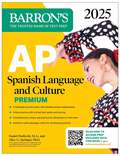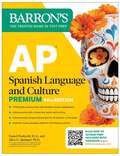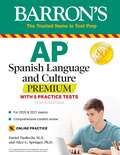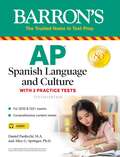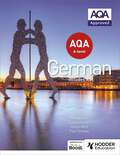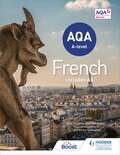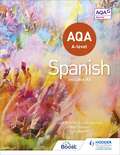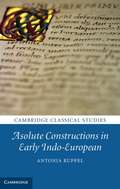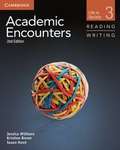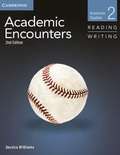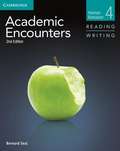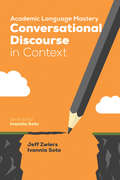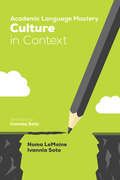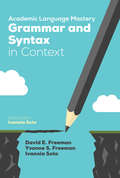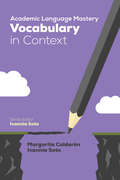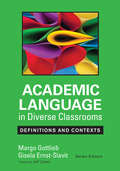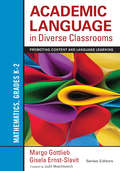- Table View
- List View
AP Spanish Language and Culture Premium, 2025: Prep Book with 5 Practice Tests + Comprehensive Review + Online Practice (Barron's AP Prep)
by Daniel Paolicchi M.A. Alice G. Springer Ph.D.Be prepared for exam day with Barron&’s. Trusted content from AP experts!Barron&’s AP Spanish Language and Culture Premium, 2025 includes in‑depth content review and online audio and practice. It&’s the only book you&’ll need to be prepared for exam day.Written by Experienced EducatorsLearn from Barron&’s‑‑all content is written and reviewed by AP expertsBuild your understanding with comprehensive review tailored to the most recent examGet a leg up with tips, strategies, and study advice for exam day‑‑it&’s like having a trusted tutor by your sideBe Confident on Exam DaySharpen your test‑taking skills with 5 full‑length practice tests‑‑2 in the book and 3 more online–plus detailed answer explanationsBoost your confidence by reviewing helpful strategies for answering all questions that involve print and/or audio textsReinforce your learning by tackling Reading Comprehension and Listening Comprehension practice exercises and reviewing the accompanying answers and explanationsStrengthen your ability to write and speak Spanish with advice for writing email replies, writing an argumentative essay, carrying on a conversation, and making cultural comparisonsReview and practice some of the most common features of Spanish language with a thorough grammar reviewOnline Audio and PracticeContinue your practice with 3 full‑length practice tests on Barron&’s Online Learning HubSimulate the exam experience with a timed test optionDeepen your understanding with detailed answer explanations and expert adviceGain confidence with scoring to check your learning progressFamiliarize yourself with spoken Spanish by listening to authentic Spanish audio passages and following along with audioscripts in the book
AP Spanish Language and Culture Premium, Fourteenth Edition: Prep Book with 5 Practice Tests + Comprehensive Review + Online Practice (Barron's AP Prep)
by Daniel Paolicchi M.A. Alice G. Springer Ph.D. Barron's Educational SeriesBe prepared for exam day with Barron&’s. Trusted content from AP experts! Barron&’s AP Spanish Language and Culture Premium, Fourteenth Edition includes in‑depth content review and online audio and practice. It&’s the only book you&’ll need to be prepared for exam day.Written by Experienced Educators Learn from Barron&’s‑‑all content is written and reviewed by AP experts Build your understanding with comprehensive review tailored to the most recent exam Get a leg up with tips, strategies, and study advice for exam day‑‑it&’s like having a trusted tutor by your side Be Confident on Exam Day Sharpen your test‑taking skills with 5 full‑length practice tests‑‑2 in the book and 3 more online–plus detailed answer explanations Boost your confidence by reviewing helpful strategies for answering all questions that involve print and/or audio texts Reinforce your learning by tackling Reading Comprehension and Listening Comprehension practice exercises and reviewing the accompanying answers and explanations Strengthen your ability to write and speak Spanish with advice for writing email replies, writing an argumentative essay, carrying on a conversation, and making cultural comparisons Review and practice some of the most common features of Spanish language with a thorough grammar review Online Audio and Practice Continue your practice with 3 full‑length practice tests on Barron&’s Online Learning Hub Simulate the exam experience with a timed test option Deepen your understanding with detailed answer explanations and expert advice Gain confidence with scoring to check your learning progress Familiarize yourself with spoken Spanish by listening to authentic Spanish audio passages and following along with audioscripts in the book Publisher's Note: Products purchased from 3rd party sellers are not guaranteed by the publisher for quality, authenticity, or access to any online entities included with the product.
AP Spanish Language and Culture Premium: With 5 Practice Tests (Barron's Test Prep)
by Daniel Paolicchi M.A. Alice G. SpringerWritten by an active AP Spanish teacher, Barron&’s AP Spanish Language and Culture Premium provides the essential review material and practice exams to help you get prepared for the exam. Packed with review of the course material, this premium edition features:Five full-length practice tests: two in the book and three onlinePractice exercises throughout the bookSeparate practice and review units that provide strategies for improvement and cover: reading comprehension, writing, speaking, vocabulary, and grammarAudio online for practice with listening comprehension, dialects, and the types of conversations you&’ll see on the exam
AP Spanish Language and Culture: With 2 Practice Tests (Barron's Test Prep)
by Alice Gericke Springer Daniel Paolicchi M.A.Written by an active AP Spanish teacher, Barron&’s AP Spanish Language and Culture provides the essential review material and practice exams to help you get prepared for the exam. Packed with review of the course material, this edition features:Two full-length practice tests in the bookPractice exercises throughout the bookSeparate practice and review units that provide strategies for improvement and cover: reading comprehension, writing, speaking, vocabulary, and grammarAudio online for practice with listening comprehension, dialects, and the types of conversations you&’ll see on the exam
AP® Spanish: Language and Culture Exam Preparation
by Jorge Frisancho María T. Redmon Marta Lucía Restrepo BravoNIMAC-sourced textbook
AQA A-Level German (includes AS)
by Amy Bates Helen Kent Paul StockerOur Student Book has been approved by AQA.Support the transition from GCSE and through the new A-level specification with a single textbook that has clear progression through four defined stages of learning suitable for a range of abilities.We have developed a completely new textbook designed specifically to meet the demands of the new 2016 specification. The Student Book covers both AS and A-level in one textbook to help students build on and develop their language skills as they progress throughout the course. - Exposes students to authentic target language material with topical stimulus, and film and literature tasters for every work- Supports the transition from GCSE with clear progression through four stages of learning: transition, AS, A-level and extension- Builds grammar and translation skills with topic-related practice and a comprehensive grammar reference section- Develops language skills with a variety of tasks, practice questions and research activities- Gives students the tools they need to succeed with learning strategies throughout - Prepares students for the assessment with advice on essay-writing and the new individual research projectAudio resources to accompany the Student Book can be purchased in several ways: 1) as part of the Dynamic Learning Teaching and Learning resource, 2) downloaded separately, 3) as part of the Student eTextbook. The audio resources are not part of the AQA approval process.
AQA A-level French (includes AS)
by Jean-Claude Gilles Rod Hares Casimir D'AngeloOur Student Book has been been approved by AQA. Support the transition from GCSE and through the new A-level specification with a single textbook that has clear progression through four defined stages of learning suitable for a range of abilities.We have developed a completely new textbook designed specifically to meet the demands of the new 2016 specification. The Student Book covers both AS and A-level in one textbook to help students build on and develop their language skills as they progress throughout the course. - Supports the transition from GCSE with clear progression through four stages of learning: transition, AS, A-level and extension- Exposes students to authentic target language material with topical stimulus, and film and literature tasters for every work- Builds grammar and translation skills with topic-related practice and a comprehensive grammar reference section- Develops language skills with a variety of tasks, practice questions and research activities- Gives students the tools they need to succeed with learning strategies throughout - Prepares students for the assessment with advice on essay-writing and the new individual research projectAudio resources to accompany the Student Book can be purchased in several ways: 1) as part of the Dynamic Learning Teaching and Learning resource, 2) downloaded separately, 3) as part of the Student eTextbook. The Audio resources are not part of the AQA approval process.
AQA A-level French (includes AS)
by Hodder EducationExam Board: AQALevel: AS/A-levelSubject: FrenchFirst Teaching: September 2016First Exam: June 2017Our Student Book has been approved by AQA. Support the transition from GCSE and through the new A-level specification with a single textbook that has clear progression through four defined stages of learning suitable for a range of abilities.We have developed a completely new textbook designed specifically to meet the demands of the new 2016 specification. The Student Book covers both AS and A-level in one textbook to help students build on and develop their language skills as they progress throughout the course. - Supports the transition from GCSE with clear progression through four stages of learning: transition, AS, A-level and extension- Exposes students to authentic target language material with topical stimulus, and film and literature tasters for every work- Builds grammar and translation skills with topic-related practice and a comprehensive grammar reference section- Develops language skills with a variety of tasks, practice questions and research activities- Gives students the tools they need to succeed with learning strategies throughout - Prepares students for the assessment with advice on essay-writing and the new individual research projectAudio resources to accompany the Student Book must be purchased separately. They can be purchased in several ways: 1) as part of the Boost digital teacher resources; 2) as a separate audio download; 3) as part of the Boost eBook. The audio resources are not part of the AQA approval process.
AQA A-level German (includes AS)
by Amy Bates Jean-Claude Gilles Helen Kent Hodder Education Paul Stocker Rod Hares Kirsty Thathapudi Lauren Léchelle Séverine Chevrier-Clarke Lisa Littlewood Louise Fenner Casimir d'AngeloExam Board: AQALevel: AS/A-levelSubject: GermanFirst Teaching: September 2016First Exam: June 2017Our Student Book has been approved by AQA.Support the transition from GCSE and through the new A-level specification with a single textbook that has clear progression through four defined stages of learning suitable for a range of abilities.We have developed a completely new textbook designed specifically to meet the demands of the new 2016 specification. The Student Book covers both AS and A-level in one textbook to help students build on and develop their language skills as they progress throughout the course. - Exposes students to authentic target language material with topical stimulus, and film and literature tasters for every work- Supports the transition from GCSE with clear progression through four stages of learning: transition, AS, A-level and extension- Builds grammar and translation skills with topic-related practice and a comprehensive grammar reference section- Develops language skills with a variety of tasks, practice questions and research activities- Gives students the tools they need to succeed with learning strategies throughout - Prepares students for the assessment with advice on essay-writing and the new individual research projectAudio resources to accompany the Student Book must be purchased separately. They can be purchased in several ways: 1) as part of the Boost digital teacher resources; 2) as a separate audio download; 3) as part of the Boost eBook.The audio resources are not part of the AQA approval process.
AQA A-level Spanish (includes AS)
by Mike Thacker Tony Weston José García SánchezOur Student Book has been approved by AQA.Support the transition from GCSE and through the new A-level specification with a single textbook that has clear progression through four defined stages of learning suitable for a range of abilities.We have developed a completely new textbook designed specifically to meet the demands of the new 2016 specification. The Student Book covers both AS and A-level in one textbook to help students build on and develop their language skills as they progress throughout the course. - Exposes students to authentic target language material with topical stimulus, and film and literature tasters for every work- Supports the transition from GCSE with clear progression through four stages of learning: transition, AS, A-level and extension- Builds grammar and translation skills with topic-related practice and a comprehensive grammar reference section- Develops language skills with a variety of tasks, practice questions and research activities- Gives students the tools they need to succeed with learning strategies throughout - Prepares students for the assessment with advice on essay-writing and the new individual research projectAudio resources to accompany the Student Book can be purchased in several ways: 1) as part of the Dynamic Learning Teaching and Learning resource, 2) downloaded separately, 3) as part of the Student eTextbook. The audio resources are not part of the AQA approval process.
AQA A-level Spanish (includes AS): Spanish Vocabulary For Aqa A-level
by Mike Thacker Hodder Education Tony Weston José Antonio SánchezExam Board: AQALevel: AS/A-levelSubject: SpanishFirst Teaching: September 2017First Exam: June 2018Our Student Book has been approved by AQA.Support the transition from GCSE and through the new A-level specification with a single textbook that has clear progression through four defined stages of learning suitable for a range of abilities.We have developed a completely new textbook designed specifically to meet the demands of the new 2016 specification. The Student Book covers both AS and A-level in one textbook to help students build on and develop their language skills as they progress throughout the course. - Exposes students to authentic target language material with topical stimulus, and film and literature tasters for every work- Supports the transition from GCSE with clear progression through four stages of learning: transition, AS, A-level and extension- Builds grammar and translation skills with topic-related practice and a comprehensive grammar reference section- Develops language skills with a variety of tasks, practice questions and research activities- Gives students the tools they need to succeed with learning strategies throughout - Prepares students for the assessment with advice on essay-writing and the new individual research projectAudio resources to accompany the Student Book must be purchased separately. They can be purchased in several ways: 1) as part of the Boost digital teacher resources; 2) as a separate audio download; 3) as part of the Boost eBook.The audio resources are not part of the AQA approval process.
Absolute Constructions in Early Indo-European
by Antonia RuppelIn the past, discussions of absolute constructions (ACs) have been limited by an imprecise understanding of what ACs are. By examining the nature and function of ACs and related constructions in Greek, Latin and Sanskrit, this new study arrives at a clear and simple definition of ACs. Focussing on the earliest attested material in each language, it highlights how AC usage differs between languages and offers explanations for these differences. Identifying the common core shared by all ACs, it suggests a starting-point and way by which they developed into Greek, Latin and Sanskrit. Further historical study reveals how ACs have been conceived of by grammarians, philologists and even Christian missionaries over the last two thousand years and how enduring misconceptions still affect our discussion of them today. All Sanskrit material is annotated in detail, making it accessible for classicists in particular and allowing a better understanding of ACs in Greek and Latin.
Academic Encounters Level 3 Student's Book Reading And Writing And Writing Skills
by WilliamsJessicaThe Academic Encounters Second edition series uses a sustained content approach to teach skills necessary for taking academic courses in English. There are two books for each content area. Academic Encounters Level 3 Student's Book Reading and Writing Life in Society engages students with authentic academic readings, photos, and charts on stimulating topics from the field of sociology. Topics include peer pressure, the influence of the media, and balancing home and work. Students develop important skills, such as reading critically, examining graphic material, note-taking, and preparing for a quiz. By completing writing assignments, students build academic writing skills and incorporate what they have learned. The topics correspond with those in Academic Encounters Level 3 Listening and Speaking Life in Society. The books may be used independently or together.
Academic Encounters Reading Writing: American Studies
by Janis P. MeekTopics include the foundations of government, equal rights, and the American Dream. Students develop important skills such as skimming, reading for the main idea, reading for speed, understanding vocabulary in context, summarizing, and note-taking. By completing writing assignments, students build academic writing skills and incorporate what they have learned.
Academic Encounters, Level 4: Human Behavior (2nd Edition)
by Bernard SealThe Academic Encounters 2nd edition series uses a sustained content approach to teach skills necessary for taking academic courses in English. There are two books for each content area. Academic Encounters Level 4 Reading and Writing Human Behavior engages students with authentic academic readings from college textbooks, photos, and charts on stimulating topics from the fields of psychology and communications. Topics include health, intelligence, and interpersonal relationships. Students develop important skills such as skimming, reading for the main idea, reading for speed, understanding vocabulary in context, summarizing, and note-taking. By completing writing assignments, students build academic writing skills and incorporate what they have learned. The topics correspond with those in Academic Encounters Level 4 Listening and Speaking Human Behavior. The books may be used independently or together.
Academic Language Mastery: Conversational Discourse in Context
by Jeff Zwiers Ivannia SotoBy now it’s a given: if we’re to help our ELLs and SELs access the rigorous demands of today’s content standards, we must cultivate the "code" that drives school success: academic language. Look no further for assistance than this much-anticipated series from Ivannia Soto, in which she invites field authorities Jeff Zwiers, David and Yvonne Freeman, Margarita Calderon, and Noma LeMoine to share every teacher’s need-to-know strategies on the four essential components of academic language. The subject of this volume is conversational discourse. Here, Jeff Zwiers reveals the power of academic conversation in helping students develop language, clarify concepts, comprehend complex texts, and fortify thinking and relational skills. With this book as your roadmap, you’ll learn how to: Foster the skills and language students must develop for productive interactions Implement strategies for scaffolding paired conversations Assess student’s oral language development as you go It’s imperative that our ELLs and SELs practice academic language in rich conversations with others in school, especially when our classrooms may be their only opportunities to receive modeling, scaffolding, and feedback focused on effective discourse. This book, in concert with the other three volumes in the series, can provide both a foundation and a framework for accelerating the learning of diverse students across grade levels and disciplines.
Academic Language Mastery: Conversational Discourse in Context
by Jeff Zwiers Ivannia SotoBy now it’s a given: if we’re to help our ELLs and SELs access the rigorous demands of today’s content standards, we must cultivate the "code" that drives school success: academic language. Look no further for assistance than this much-anticipated series from Ivannia Soto, in which she invites field authorities Jeff Zwiers, David and Yvonne Freeman, Margarita Calderon, and Noma LeMoine to share every teacher’s need-to-know strategies on the four essential components of academic language. The subject of this volume is conversational discourse. Here, Jeff Zwiers reveals the power of academic conversation in helping students develop language, clarify concepts, comprehend complex texts, and fortify thinking and relational skills. With this book as your roadmap, you’ll learn how to: Foster the skills and language students must develop for productive interactions Implement strategies for scaffolding paired conversations Assess student’s oral language development as you go It’s imperative that our ELLs and SELs practice academic language in rich conversations with others in school, especially when our classrooms may be their only opportunities to receive modeling, scaffolding, and feedback focused on effective discourse. This book, in concert with the other three volumes in the series, can provide both a foundation and a framework for accelerating the learning of diverse students across grade levels and disciplines.
Academic Language Mastery: Culture In Context
by Noma R. LeMoine Ivannia SotoBy now it’s a given: if we’re to help our ELLs and SELs access the rigorous demands of today’s content standards, we must cultivate the "code" that drives school success: academic language. Look no further for assistance than this much-anticipated series from Ivannia Soto, in which she invites field authorities Jeff Zwiers, David and Yvonne Freeman, Margarita Calderon, and Noma LeMoine to share every teacher’s need-to-know strategies on the four essential components of academic language. The subject of this volume is culture. Here, Noma LeMoine makes clear once and for all how culturally and linguistically responsive pedagogy validates, facilitates, liberates, and empowers ethnically diverse students. With this volume as your roadmap, you’ll learn how to: Implement instructional strategies designed to meet the linguistic and cultural needs of ELLs and SELs Use language variation as an asset in the classroom Recognize and honor prior knowledge, home languages, and cultures The culture and language every student brings to the classroom have vast implications for how to best structure the learning environment. This guidebook will help you get started as early as tomorrow. Better yet, read all four volumes in the series as an all-in-one instructional plan for closing the achievement gap.
Academic Language Mastery: Culture In Context
by Noma R. LeMoine Ivannia SotoBy now it’s a given: if we’re to help our ELLs and SELs access the rigorous demands of today’s content standards, we must cultivate the "code" that drives school success: academic language. Look no further for assistance than this much-anticipated series from Ivannia Soto, in which she invites field authorities Jeff Zwiers, David and Yvonne Freeman, Margarita Calderon, and Noma LeMoine to share every teacher’s need-to-know strategies on the four essential components of academic language. The subject of this volume is culture. Here, Noma LeMoine makes clear once and for all how culturally and linguistically responsive pedagogy validates, facilitates, liberates, and empowers ethnically diverse students. With this volume as your roadmap, you’ll learn how to: Implement instructional strategies designed to meet the linguistic and cultural needs of ELLs and SELs Use language variation as an asset in the classroom Recognize and honor prior knowledge, home languages, and cultures The culture and language every student brings to the classroom have vast implications for how to best structure the learning environment. This guidebook will help you get started as early as tomorrow. Better yet, read all four volumes in the series as an all-in-one instructional plan for closing the achievement gap.
Academic Language Mastery: Grammar And Syntax In Context
by Yvonne S. Freeman David E. Freeman Ivannia SotoBy now it’s a given: if we’re to help our ELLs and SELs access the rigorous demands of today’s content standards, we must cultivate the "code" that drives school success: academic language. Look no further for assistance than this much-anticipated series from Ivannia Soto, in which she invites field authorities Jeff Zwiers, David and Yvonne Freeman, Margarita Calderon, and Noma LeMoine to share every teacher’s need-to-know strategies on the four essential components of academic language. The subject of this volume is grammar and syntax. Here, David and Yvonne Freeman shatter the myth that academic language is all about vocabulary, revealing how grammar and syntax inform our students’ grasp of challenging text. With this book as your roadmap, you’ll learn how to: Teach grammar in the context of students’ speech and writing Use strategies such as sentence frames, passives, combining simple sentences into more complex sentences, and nominalization to create more complex noun phrases Assess academic language development through a four-step process Look inside and discover the tools you need to help students master more sophisticated and complex grammatical and syntactical structures right away. Better yet, read all four volumes in the series and put in place a start-to-finish instructional plan for closing the achievement gap.
Academic Language Mastery: Grammar And Syntax In Context
by Yvonne S. Freeman David E. Freeman Ivannia SotoBy now it’s a given: if we’re to help our ELLs and SELs access the rigorous demands of today’s content standards, we must cultivate the "code" that drives school success: academic language. Look no further for assistance than this much-anticipated series from Ivannia Soto, in which she invites field authorities Jeff Zwiers, David and Yvonne Freeman, Margarita Calderon, and Noma LeMoine to share every teacher’s need-to-know strategies on the four essential components of academic language. The subject of this volume is grammar and syntax. Here, David and Yvonne Freeman shatter the myth that academic language is all about vocabulary, revealing how grammar and syntax inform our students’ grasp of challenging text. With this book as your roadmap, you’ll learn how to: Teach grammar in the context of students’ speech and writing Use strategies such as sentence frames, passives, combining simple sentences into more complex sentences, and nominalization to create more complex noun phrases Assess academic language development through a four-step process Look inside and discover the tools you need to help students master more sophisticated and complex grammatical and syntactical structures right away. Better yet, read all four volumes in the series and put in place a start-to-finish instructional plan for closing the achievement gap.
Academic Language Mastery: Vocabulary In Context
by Margarita Espino Calderon Ivannia SotoBy now it’s a given: if we’re to help our ELLs and SELs access the rigorous demands of today’s content standards, we must cultivate the "code" that drives school success: academic language. Look no further for assistance than this much-anticipated series from Ivannia Soto, in which she invites field authorities Jeff Zwiers, David and Yvonne Freeman, Margarita Calderon, and Noma LeMoine to share every teacher’s need-to-know strategies on the four essential components of academic language. The subject of this volume is vocabulary. Here, Margarita Calderon reveals how vocabulary is best taught as a tool for completing and constructing more complex messages. With this book as your roadmap, you’ll learn how to: Teach high-frequency academic words and discipline-specific vocabulary across content areas Utilize strategies for teaching academic vocabulary, moving students from Tier 1 to Tiers 2 and 3 words and selecting appropriate words to teach Assess vocabulary growth as you go Our vocabulary instruction must come from the texts our ELLs and SELs are about to read, not from a set of activities that teach words in isolation. This guidebook will help you get started as early as tomorrow. Better yet, read all four volumes in the series and put in place an all-in-one instructional plan for closing the achievement gap.
Academic Language Mastery: Vocabulary In Context
by Margarita Espino Calderon Ivannia SotoBy now it’s a given: if we’re to help our ELLs and SELs access the rigorous demands of today’s content standards, we must cultivate the "code" that drives school success: academic language. Look no further for assistance than this much-anticipated series from Ivannia Soto, in which she invites field authorities Jeff Zwiers, David and Yvonne Freeman, Margarita Calderon, and Noma LeMoine to share every teacher’s need-to-know strategies on the four essential components of academic language. The subject of this volume is vocabulary. Here, Margarita Calderon reveals how vocabulary is best taught as a tool for completing and constructing more complex messages. With this book as your roadmap, you’ll learn how to: Teach high-frequency academic words and discipline-specific vocabulary across content areas Utilize strategies for teaching academic vocabulary, moving students from Tier 1 to Tiers 2 and 3 words and selecting appropriate words to teach Assess vocabulary growth as you go Our vocabulary instruction must come from the texts our ELLs and SELs are about to read, not from a set of activities that teach words in isolation. This guidebook will help you get started as early as tomorrow. Better yet, read all four volumes in the series and put in place an all-in-one instructional plan for closing the achievement gap.
Academic Language in Diverse Classrooms: Definitions and Contexts
by Dr Margo Gottlieb Gisela Ernst-SlavitEnsure your school speaks the language of success! Since the introduction of the Common Core, schools realize the necessity for a deep understanding of academic language as a stepping stone to academic achievement. The expectations for more robust curriculum, instruction, and assessment require administrators, teachers, and students to retool for academic success. This companion volume to Margo Gottlieb and Gisela Ernst-Slavit’s six-book series on academic language provides a thorough overview of key concepts and effective practices. Optimized for curricular planning and in-classroom reference, with particular attention to linguistically and culturally diverse students, the book includes: Definitions and examples of the dimensions of academic language. A step-by-step template for teachers to incorporate academic language into their planning for student learning. Graphic models that illustrate academic language use across the content areas.
Academic Language in Diverse Classrooms: Promoting Content and Language Learning
by Dr Margo Gottlieb Gisela Ernst-SlavitMake every student fluent in the language of learning. The Common Core and ELD standards provide pathways to academic success through academic language. Using an integrated Curricular Framework, districts, schools and professional learning communities can: Design and implement thematic units for learning Draw from content and language standards to set targets for all students Examine standards-centered materials for academic language Collaborate in planning instruction and assessment within and across lessons Consider linguistic and cultural resources of the students Create differentiated content and language objectives Delve deeply into instructional strategies involving academic language Reflect on teaching and learning
